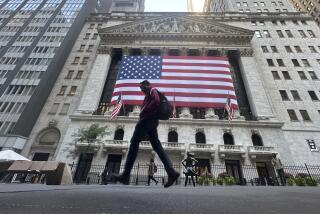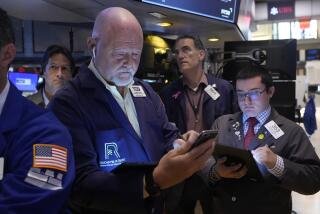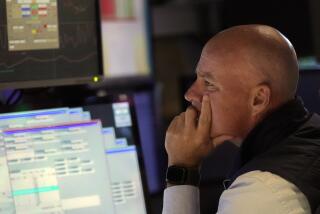Stocks kick off quarter with a bang
NEW YORK — The stock market began the second quarter with an impressive rally Tuesday as investors dared to believe -- at least for a day -- that Wall Street is nearing the end of its painful sub-prime mortgage saga.
Recapturing in one day nearly half of its decline for all of the first quarter, the Dow Jones industrial average soared 391.47 points, or 3.2%, to 12,654.36. The blue-chip gauge sagged 7.6% in the first quarter, which ended Monday.
Investors were encouraged by the plans of Wall Street firm Lehman Bros. Holdings Inc., Swiss banking giant UBS and a long-troubled mortgage company to raise fresh capital to shore up their balance sheets.
The market even put a positive interpretation on disclosures by UBS and Germany’s Deutsche Bank of more than $20 billion in fresh write-downs of their debt holdings.
Financial stocks in the Standard & Poor’s 500 index surged 7.5% as a group.
Big write-offs and capital infusions that reduce the stakes of existing shareholders normally aren’t reasons for cheer on Wall Street. But many investors apparently concluded that the latest write-downs could mark the last major bank losses stemming from the mortgage crisis and resulting credit crunch.
“Investors are perceiving that we are probably right near the end of this bad news,” said Georges Yared, chief investment strategist at Yared Investment Research in Minneapolis.
“The numbers aren’t pretty,” he added, but they do provide clarity. “It’s almost a relief on Wall Street.”
Stocks also got a lift from a closely watched survey suggesting that U.S. manufacturing activity weakened less than expected last month.
Broader stock measures posted even steeper gains than the Dow. The Standard & Poor’s 500 index climbed 47.48 points, or 3.6%, to 1,370.18, taking back about a third of its 9.9% first-quarter skid.
The Nasdaq composite index, which sank 14.1% in the first three months of the year, shot up 83.65 points, or 3.7%, to 2,362.75.
But the three indexes remain well off their highs of 2007. The Dow is off 11%, the S&P; is down 12% and the Nasdaq is off 17%.
And after Tuesday’s big gains, the question is whether they will have any staying power.
Last month the Dow had two one-day gains of more than 400 points each, but both proved ephemeral.
This week the best advice might be to check back Friday, when the government will release March unemployment data. A pickup in joblessness could test the market’s fledgling resilience.
Stocks also rocketed Tuesday in Europe, where markets declined much more sharply than Wall Street did in the first quarter. Key indexes climbed 2.6% in Britain, 3.4% in France and 2.8% in Germany.
Other markets joined stocks in running counter to their recent trends.
The beaten-down dollar rallied on the stronger-than-expected manufacturing report. The euro tumbled to $1.56 from nearly $1.58 late Monday.
Yields on Treasury bonds jumped as investors felt bold enough to sell the relatively safe securities and invest in stocks. The yield on the 10-year T-note rose to 3.56% from 3.41%.
Commodities, many of which have set record highs in recent months, fell back.
Gold sank below $900 an ounce, falling $33.30 to $882.90. Oil fell below $100 a barrel before rebounding. Crude futures settled at $100.98, down 60 cents for the day.
The Reuters/Jefferies CRB commodity index fell 0.5%.
The stock market bolted higher at the outset after Lehman Bros. said it had raised $4 billion in a move designed to end speculation that the firm could suffer a liquidity squeeze similar to the one that did in Bear Stearns Cos. last month. Lehman’s shares surged $6.70, or 18%, to $44.34.
UBS said it would seek to raise more than $15 billion in capital after suffering a huge first-quarter loss driven by a mammoth $19-billion write-down of faltering mortgage assets. Its U.S.-traded shares swelled $4.21, or 15%, to $33.01.
Deutsche Bank’s U.S. shares rose $4.70 to $117.75 after the company reported $3.9 billion in write-downs.
Shares of Citigroup and Merrill Lynch, firms that are also expected to report sizable sub-prime write-offs and capital infusions in the next few weeks, surged as well.
Citigroup gained $2.42, or 11%, to $23.84. Merrill advanced $5.28, or 13%, to $46.02.
Thornburg Mortgage rose 24 cents, or 20%, to $1.45 after the provider of big home mortgages said it raised $1.35 billion in a successful effort to avoid bankruptcy. The deal is expected to cut the stake of existing shareholders to 5.5%.
Fannie Mae rocketed $5.18, or 20%, to $31.50. Freddie Mac rose $3.90, or 15%, to $29.22. The government-chartered mortgage finance giants also are seeking to raise capital.
JPMorgan Chase surged $4.05, or 9.4%, to $47. Bear Stearns rose 36 cents, or 3.4%, to $10.85, above the current $10.22-a-share value of JPMorgan’s deal for its smaller rival.
Beyond the day’s news, a number of technical factors also may have boosted stocks.
Traders said there was buying pressure from so-called short-sellers, who had bet that stocks would fall lower and had to unwind their bets when the market began to rise.
The rally also was propelled by investors willing to buy into depressed stocks on the first day of the new quarter, experts said.
Some money managers shy away from buying troubled companies at the end of quarters to avoid looking bad when their holdings are revealed in quarterly disclosures.
If you want to buy an ailing stock, “you’d be foolish to buy it before the end of the quarter and show it on your books,” said Bill Buechler, president of Buechler Capital Asset Management in La Jolla.
In other market highlights:
The Russell 2000 index of smaller companies rose 22.68, or 3.3%, to 710.65.
Advancing issues outnumbered decliners by about 4 to 1 on the New York Stock Exchange. Volume was heavy.
--
More to Read
Inside the business of entertainment
The Wide Shot brings you news, analysis and insights on everything from streaming wars to production — and what it all means for the future.
You may occasionally receive promotional content from the Los Angeles Times.








